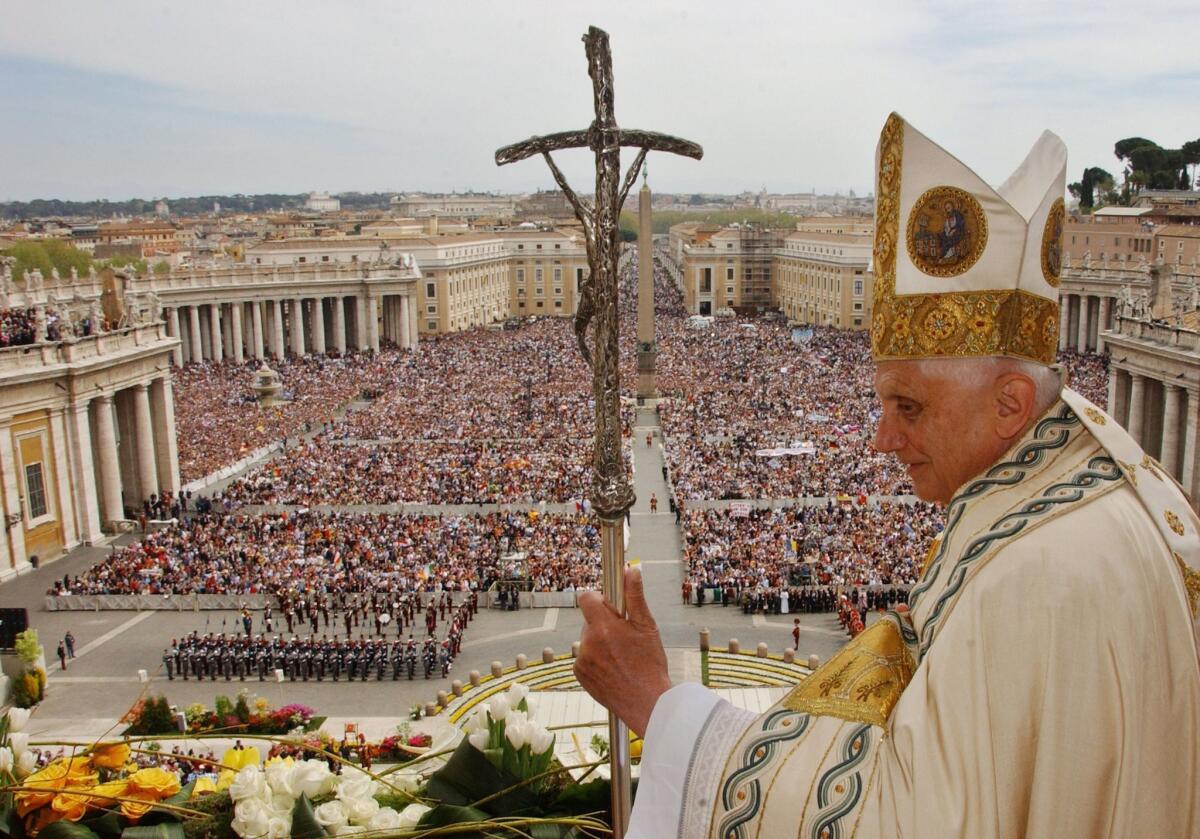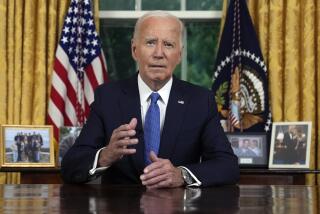Pope’s resignation, ‘a generous act,’ could transform Vatican

- Share via
Pleading exhaustion, Pope Benedict XVI broke a 600-year taboo this week in announcing that he would resign as leader of the Roman Catholic Church and live out the rest of his life in prayer and contemplation. It could change the profile of the papacy forever.
The decision took many by surprise, although the ailing 85-year-old pontiff had hinted over the years that he would step down if and when he felt unequal to the demanding job of tending the global flock of 1.2 billion Catholics.
Reaction among religious scholars and Benedict’s brethren at the Vatican has been stunned admiration. The pope has put the needs of the church first, they say, and concluded that he can no longer muster the “strength of mind and body” to fulfill the withering agenda of overseas travel, 24/7 communication, preaching and administration.
Benedict’s managed departure will benefit the church in a host of ways, Vatican analysts say. Future popes will now feel free to pass the baton when they realize they are in failing health, averting the stagnation that often marked a frail pope’s final years. The newly perceived option of retirement also could encourage the College of Cardinals to consider younger, more dynamic candidates when choosing a new pope or even extending to the papacy the retirement age of 75 that applies to bishops.
“I think this will set a very good precedent for when a pope in office begins to become feeble or incapacitated, mentally or physically or both,” said Chester Gillis, a professor of theology and dean of Georgetown College. “Popes have always had the freedom to step down but they didn’t, until now. That makes so much sense in the 21st century, when longevity and modern medicine mean people live a long time.”
A pope today runs a massive, global operation, not unlike a multinational corporation. He is expected to travel to the faith’s far-flung congregations and craft important doctrinal policy and teachings. He is supposed to preside over worldwide gatherings like World Youth Day, set for July in Rio de Janiero, and celebrate Mass on religious holidays, including Lent, which begins Wednesday and culminates on March 31 with Easter Sunday.
“The timing of his announcement is interesting, just before Lent. He might have looked at the calendar and said to himself, and to God: ‘I don’t have the energy to go through another Lent and Holy Week. All that public ceremony is exhausting,’ ” Gillis speculated.
It was revealed on Tuesday that Benedict had been fitted with a pacemaker even before he was made pope, and that the device regulating his heartbeat had to be replaced recently. The pope’s older brother and fellow priest, Georg Ratzinger, told reporters in Germany after Benedict’s announcement that his brother’s doctor had advised against any further transatlantic travel. And the pope’s diminishing physical capacities were increasingly apparent in his slow, hunched gait and reliance on canes, escorts and motorized pathways to negotiate St. Peter’s Basilica.
In a detailed Q&A; on the forthcoming papal transition, Father Thomas J. Reese of the Woodstock Theological Center at Georgetown University noted that popes have always had the right to resign but felt spiritually obliged to suffer through the burdens of the calling. Pope Paul VI observed in 1975 that “paternity cannot be resigned,” setting what until now had been the accepted interpretation that the job was a pope’s responsibility for life.
Benedict’s decision to call it quits “is a big, bold courageous move” that will be the enduring legacy of a papacy that drifted from one focus to another over the last eight years, veteran Vatican reporter John Thavis told The Times’ book department in an interview from Rome on Tuesday.
“Now every pope will consider resignation” when he feels himself weakening and unable to fully perform his duties, said Thavis, discussing his book “The Vatican Diaries,” which chronicles 30 years of Holy See coverage and is due out at the end of the month.
Contrasting the current pope’s judgment of his abilities with John Paul II’s debilitated final years, when Parkinson’s disease and hip injuries sidelined him, Thavis described Benedict as “a pope of reason. He felt this was the time to show the world another way and to bring the church into the modern world.”
Benedict’s resignation creates an opportunity to redirect attention from the issues in debate in Western congregations -- sexuality, gay marriage and the clergy sex abuse scandals -- to the needs of the developing world congregations, said Mathew N. Schmalz, a professor of religious studies at College of the Holy Cross in Worcester, Mass.
Benedict alluded to the changing demands of the church in his letter to cardinals Monday, Schmalz noted, when he spoke of the “new context” the papacy finds itself in, one shaped by fast-paced social media and a crushing workload.
“The pope really needs to be someone who understands the power of social media and is also aware of its dangers,” Schmalz said.
Georgetown College’s Gillis pointed out that Benedict “could have held on to fame and power and stayed to the end. But he didn’t want to do that. What he’s done is a generous act, a real gift to the church.”
RELATED:
Vatican reveals that Pope Benedict XVI has a pacemaker
Speculation on pope’s successor turns to Africa, Latin America
In Vatican City, mixed opinions on Pope Benedict XVI’s decision
A foreign correspondent for 25 years, Carol J. Williams traveled to and reported from more than 80 countries in Europe, Asia, the Middle East and Latin America.
More to Read
Sign up for Essential California
The most important California stories and recommendations in your inbox every morning.
You may occasionally receive promotional content from the Los Angeles Times.











